In this post, I’ll discuss the best altcoin wallets for staking, ensuring you earn rewards while keeping your crypto safely stored.
I’ll discuss hardware and software wallets, their respective features, security, and staking capabilities.
This guide will benefit both beginner and advanced investors by informing you about the best wallets to maximize your staking rewards.
Key Points & Top Altcoin Wallets For Staking List
| Wallet Name | Key Points for Staking |
|---|---|
| Coinbase Wallet | User-friendly, supports multiple altcoins, integrates with Coinbase exchange for easy staking. |
| Exodus Wallet | Easy-to-use interface, supports a wide range of cryptocurrencies, staking rewards available in-app. |
| Ledger Nano X | Hardware wallet, high security, supports staking of major altcoins offline. |
| Trust Wallet | Mobile-friendly, supports many altcoins, allows in-app staking directly. |
| Freewallet | Supports multiple coins, easy staking interface, online wallet convenience. |
| Atomic Wallet | Decentralized, supports multiple altcoins, offers in-app staking for various coins. |
| MyEtherWallet | Ethereum-focused, allows staking ETH2.0, integrates with hardware wallets for security. |
| Coinomi Wallet | Multi-asset support, in-app staking for selected altcoins, strong security features. |
| Binance Wallet | Integrated with Binance exchange, easy staking of supported altcoins, competitive rewards. |
| Trezor Model T | Hardware wallet, high security, supports staking via third-party integrations. |
10 Top Altcoin Wallets For Staking
1. Coinbase Wallet
For both seasoned and novice cryptocurrency users, Coinbase Wallet is straightforward to use. The wallet features numerous advanced altcoins and works seamlessly with Coinbase, enabling users to stake coins directly from their wallets.
Coinbase Wallet permits staking on Ethereum, Algorand, and Tezos, among other coins. The wallet’s security features include biometric authentication and users retaining and controlling their own private keys.

Customers can track real-time staking rewards and use the wallet to manage multiple assets and DeFi apps. For people wanting ease, dependability, and reliable staking services, Coinbase Wallet is an excellent choice.
| Pros | Cons |
|---|---|
| User-friendly interface suitable for beginners | Limited control over advanced staking options compared to hardware wallets |
| Supports multiple altcoins for staking | Requires integration with Coinbase exchange for some features |
| Real-time monitoring of staking rewards | Custodial nature may concern privacy-focused users |
| Biometric authentication and secure private key storage | Fees may apply for certain transactions |
| Easy DeFi and staking integration | Not ideal for offline cold storage |
2. Exodus Wallet
Exodus wallet works on both mobile and desktop and supports several assets. The wallet is known for its intuitive design. The app allows for staking on Tezos and several other altcoins such as Cosmos and Algorand.
Rewards to stakes are automatically calculated and available for easy claiming to make things easy for advanced and beginner users alike. Users can swap coins without leaving the wallet due to built-in exchange services.
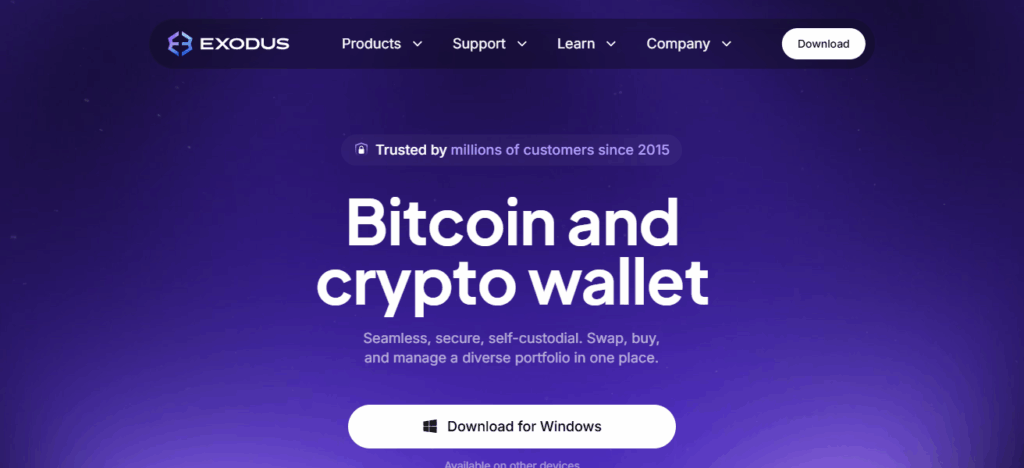
The Exodus wallet’s sophisticated security features ensures that the private keys are stored on the device. The wallet is extremely beginner-friendly.
Users who want to passively grow or acquire crypto will find crypto staking features in Exodus’s wallet attractive.
| Pros | Cons |
|---|---|
| Supports staking for multiple altcoins like Tezos and Algorand | Desktop/mobile wallet may be vulnerable to device malware |
| Attractive and intuitive interface | No hardware wallet-level security |
| Automatic calculation and distribution of staking rewards | Limited customization for advanced users |
| Built-in exchange for swapping coins | Some altcoins may not be supported for staking |
| Cross-platform support | Dependent on internet connection |
3. Ledger Nano X
Ledger Nano X is one of the best hardware wallets because it allows you to stake altcoins offline with maximum security. It supports multiple cryptocurrencies, including Ethereum, Tezos, and Polkadot.
The Ledger Live companion app allows users to stake directly and tracks rewards in real-time. Ledger Nano X, being a hardware wallet, stash offline private keys, preventing funds from getting hacked or infected with malware.
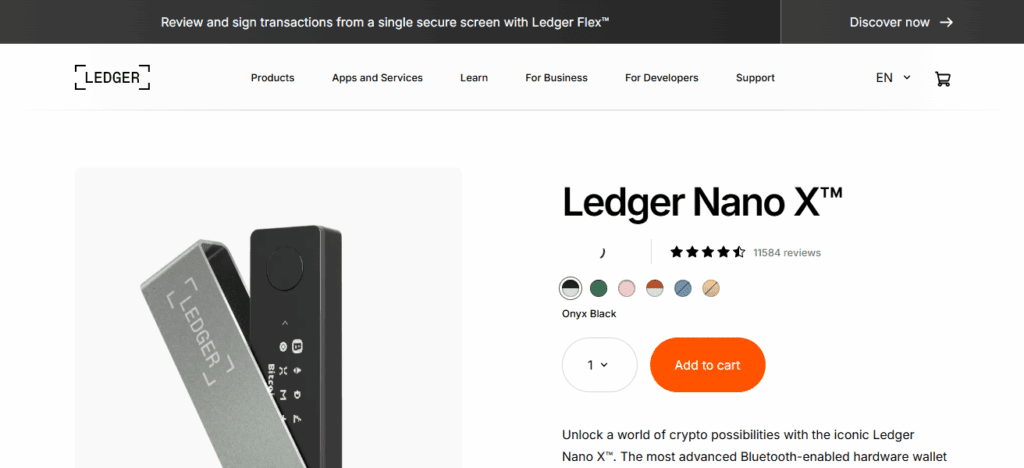
Bluetooth functionality enables secure mobile management and ensures complete security. Though the wallet comes with a price tag, it is a secure investment for long-term crypto holders.
The wallet has many cryptocurrencies, easy staking, and excellent security. It use these to protect and control over their assets.
| Pros | Cons |
|---|---|
| Top-tier hardware security for offline staking | Expensive initial purchase cost |
| Supports multiple staking coins | Requires Ledger Live app for management |
| Bluetooth connectivity allows mobile use | Staking setup may be complex for beginners |
| Real-time reward tracking via Ledger Live | Not as convenient as mobile wallets for quick swaps |
| Private keys remain offline, minimizing hack risks | Limited coin support compared to online wallets |
4. Trust Wallet
This mobile-first wallet allows staking on many altcoins such as Tezos, Tron, and Binance Coin. Trust Wallet’s sleek design simplifies in-app staking, enabling users to delegate coins and earn rewards easily.
Trust Wallet is non-custodial, allowing users to keep full control over their private keys enhancing Trust Wallet’s security. It has support for DeFi, NFTs, direct token swaps, and many more.
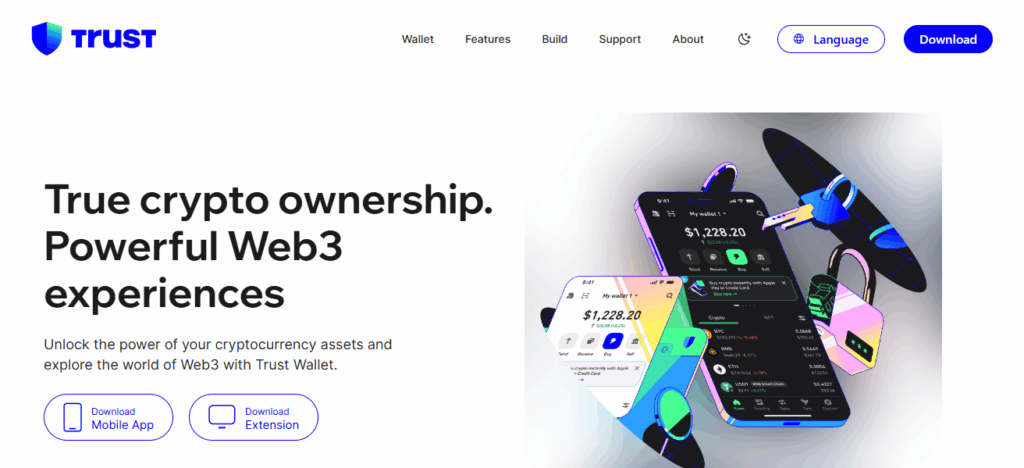
Users can also track their staking rewards in real-time and change their staking preferences at any time.
Trust Wallet’s iOS and Android interfaces offer an easy-to-use wallet, with strong community support and multiple coin staking options.
| Pros | Cons |
|---|---|
| Mobile-friendly with in-app staking | Custodial risk is lower, but app can be lost if phone is compromised |
| Supports multiple altcoins | Some coins require delegation to third-party validators |
| Non-custodial with private key control | Staking rewards vary depending on coin and validator |
| Integration with DeFi, NFTs, and swaps | Limited desktop functionality |
| Easy to monitor and adjust staking | Mobile-only interface might not appeal to desktop users |
5. Freewallet
Freewallet is an outstanding option that stands out as a convenient digital wallet with online accessibility, multi-coin support, and staking options.
Freewallet allows users to stake altcoins like Tezos, Tron, and Ethereum and get other rewards without leaving the wallet.
The mobile app and the simple design both help users and beginners get the job done. There is two-factor authorization, backups, and other advanced security features that Freewallet holds as a bespoke or custodial wallet.
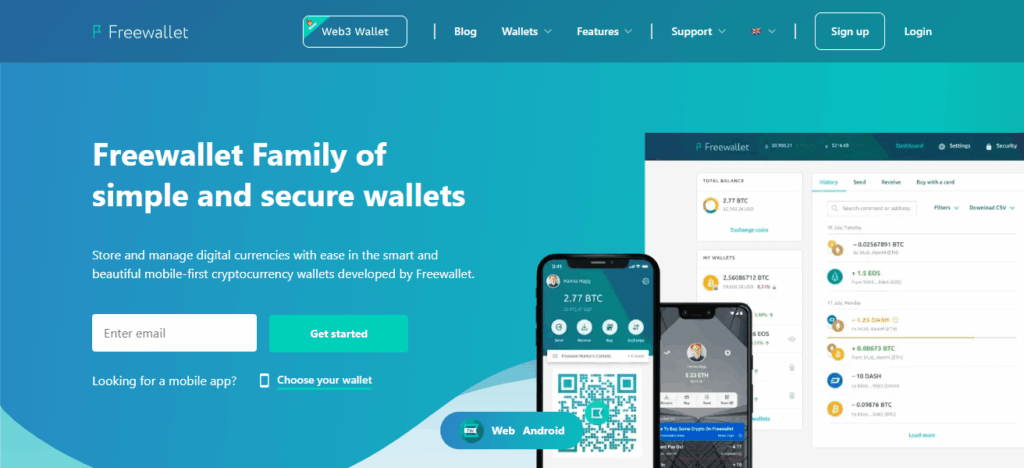
This means Freewallet holds the private keys. This does not change the fact that the users can buy, sell, and exchange assets without problem.
The dual fact that Freewallet is easy to use and casual stakers can stake many different types of altcoins without a hassle is why Freewallet is a successful option.
| Pros | Cons |
|---|---|
| Beginner-friendly with simple interface | Custodial wallet — private keys held by Freewallet |
| Supports multiple coins and in-app staking | Less control over coins and staking mechanisms |
| Accessible via mobile and web | Vulnerable to platform downtime or hacks |
| Quick buying, selling, and swapping | Lower anonymity and privacy |
| Competitive staking rewards | Limited advanced security features |
6. Atomic Wallet
This one is a multi-currency wallet with over 500 supported currencies. With Atomic Wallet, users can stake without a third party, earning rewards from Tezos, Cosmos, and Qtum. Wallet private keys are in local storage.
With Atomic Wallet, users can earn rewards from staking because they are no third party. Atomic Wallet provides decentralized web exchanges and facilitates users with atomic swaps.

It’s easy to use because it’s supported on desktops and mobile devices. Users interested in wallet applications, stake rewards, and control over crypto will find Atomic Wallet appealing.
| Pros | Cons |
|---|---|
| Decentralized with private keys stored locally | Some staking requires minimum coin amounts |
| Supports 500+ cryptocurrencies | Limited mobile interface compared to desktop |
| Built-in exchange and atomic swaps | Not as beginner-friendly as simpler wallets |
| Easy in-app staking with multiple coins | Rewards may be slightly lower than exchange staking |
| Cross-platform compatibility | Dependent on blockchain network fees for transactions |
7. MyEtherWallet
MyEtherWallet (MEW) gained recognition in the wallet industry for enabling users to stake ETH 2.0 and capitalize on other Ethereum-based staking opportunities.
Users do not relinquish control over private keys, which can be combined with other hardware wallets for additional protection.
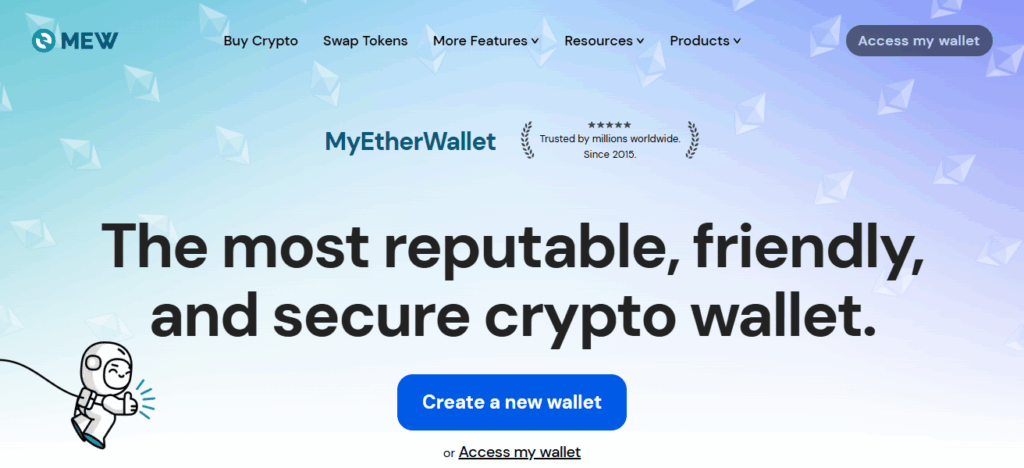
MEW even offers customers a simplistic staking interface, including for tokens, and for decentralized applications (DApps).
Users can even manage ERC-20 tokens and can take part in governance and yield farming. With staking assets and other security, and with flexible, passive income, Ethereum investors choose MEW for the transparency.
| Pros | Cons |
|---|---|
| Non-custodial, full control over private keys | Ethereum-focused; limited altcoin support |
| Staking for ETH2.0 and other ERC-20 tokens | Requires some technical knowledge for setup |
| Integration with hardware wallets for added security | No native mobile app (mobile interface via web) |
| Supports DApps and yield farming | Only Ethereum ecosystem staking is supported |
| Transparent staking rewards and governance options | Not ideal for multi-coin staking |
8. Coinomi Wallet
Coinomi Wallet is structured as a multi-asset wallet and enables users to stake selected altcoins like Tezos, Tron, and Cosmos.
It has strong security features, including local device private keys and hierarchical deterministic (HD) wallets, which provide adequate security for assets.
It also supports more than 1,700 cryptocurrencies, which is a plus for users who wish to stake and manage a crypto portfolio.
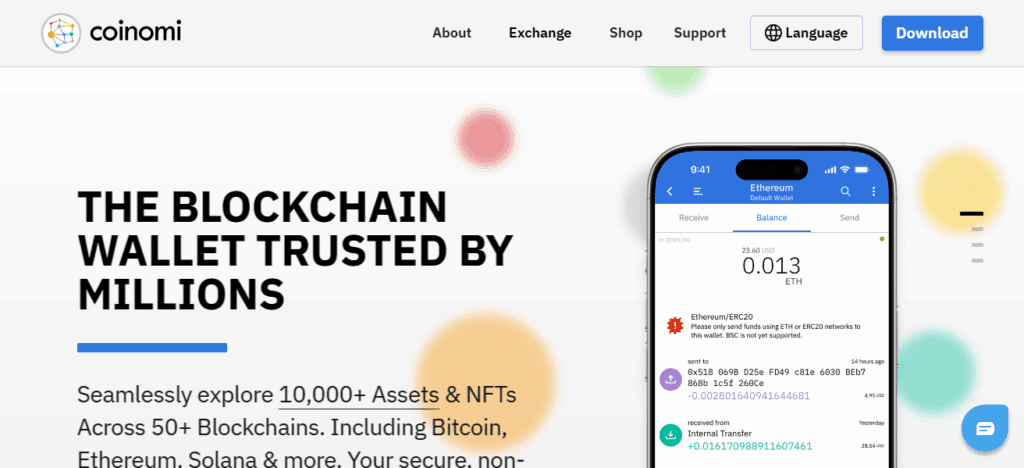
There is a streamlined method for tracking staking rewards, and the simplistic UX design is a relief to newbies.
Coinomi also features built-in exchanges and is multilingual, which is a plus for the global crypto trading community.
Coinomi’s security and multi-coin convenience make it perfect for users who want to stake crypto easily.
| Pros | Cons |
|---|---|
| Multi-asset wallet with support for staking | Only selected coins available for staking |
| Private keys stored on the device | Desktop wallet may be vulnerable to malware |
| Built-in exchange and user-friendly interface | Limited staking customization |
| Multi-language support for global users | Rewards depend on coin and network |
| Strong focus on security and privacy | May not support newer altcoins immediately |
9. Binance Wallet
Binance Wallet works well with the Binance exchange, allowing users to stake almost any altcoin. Among the Binance Wallet features, users enjoy flexible and locked staking, as well as the ability to manage the duration and yield themselves.
Binance Wallet users have access to real-time staking performance tracking, liquidity farming, a crypto swap, savings accounts, and other features.
Binance Wallet also benefits from the overall security of the Binance platform, which includes SAFU protection and two-factor authentication.
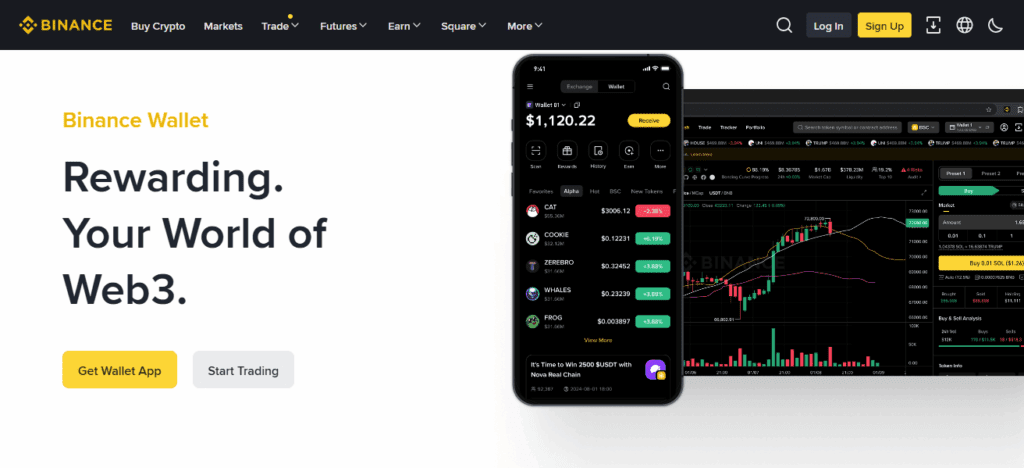
Balanced engagement for the skilled and rookie users of Binance Wallet is encouraged by the simplicity of the interface.
Overall, Binance Wallet is a perfect choice for users with optimal flexibility for altcoins and great profitability from staking rewards.
| Pros | Cons |
|---|---|
| Wide altcoin support for staking | Custodial wallet; Binance holds private keys |
| Flexible and locked staking options | Dependent on Binance platform stability |
| Competitive staking rewards | Regulatory risks depending on country |
| Real-time monitoring and management | Limited control over validator selection |
| Integrated with exchange for swaps and savings | Security relies on exchange’s infrastructure |
10. Trezor Model T
Trezor Model T is a hardware wallet with unrivaled stakes of security. It supports staking altcoins through third-party integrations and offers offline private key protection.
It is compatible with Tezos, Cosmos, Polkadot, and a range of other cryptocurrencies, all of which are protected from hacks and malware.
It is equipped with a touchscreen interface protected by a 4-digit PIN and passphrase, which makes it easy to administer.
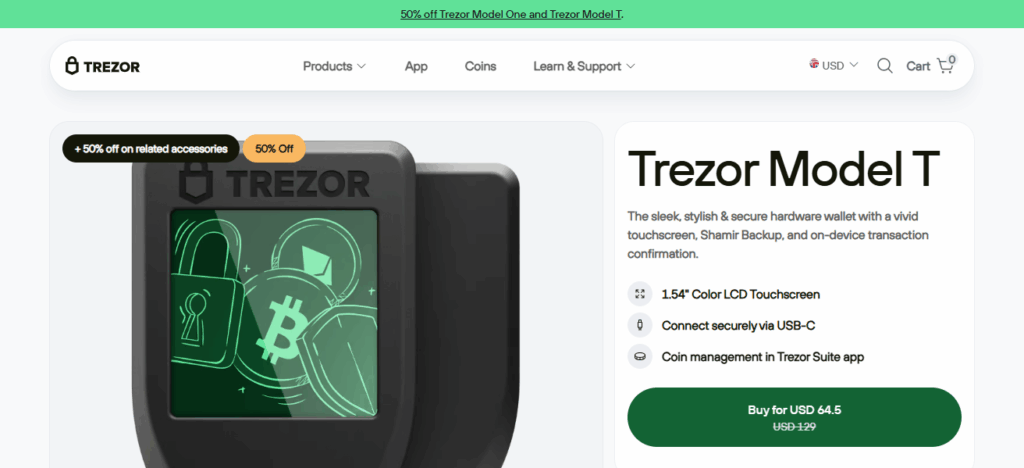
Staked assets are visible and trackable on the Trezor Suite app, which offers access to a transparent and secure staking interface.
Trezor Model T is unmatched in security and peace of mind, offered to long-term crypto investors. It supports multiple staking coins without the need to go online.
| Pros | Cons |
|---|---|
| Wide altcoin support for staking | Custodial wallet; Binance holds private keys |
| Flexible and locked staking options | Dependent on Binance platform stability |
| Competitive staking rewards | Regulatory risks depending on country |
| Real-time monitoring and management | Limited control over validator selection |
| Integrated with exchange for swaps and savings | Security relies on exchange’s infrastructure |
Conclusion
To wrap things up, having different choices means different reasons. If you are more choosy with your reasons, then perhaps you want to stake your altcoins on a wallet that is easy to use, flexible, diverse, and secure.
Ledge Nano superb and Trezor Model T have exceptional altcoin security features, while Coinbase and Trust Wallet, along with Exodus, are best for altcoins users who need staking and software wallets.
What’s more, every crypto wallet is designed to serve features of staking, control, and reward versatility along with convenience for novice investors till pros.
FAQ
A staking wallet allows you to hold crypto and earn rewards by participating in network validation or delegation.
Coinbase Wallet, Trust Wallet, and Exodus are user-friendly and ideal for beginners.
Yes, Ledger Nano X and Trezor Model T provide top security for staking offline.
Wallets like Atomic, Coinomi, and Binance support staking for multiple altcoins.
Staking is generally safe, but security depends on wallet type—hardware wallets are safest, while online wallets carry more risk.





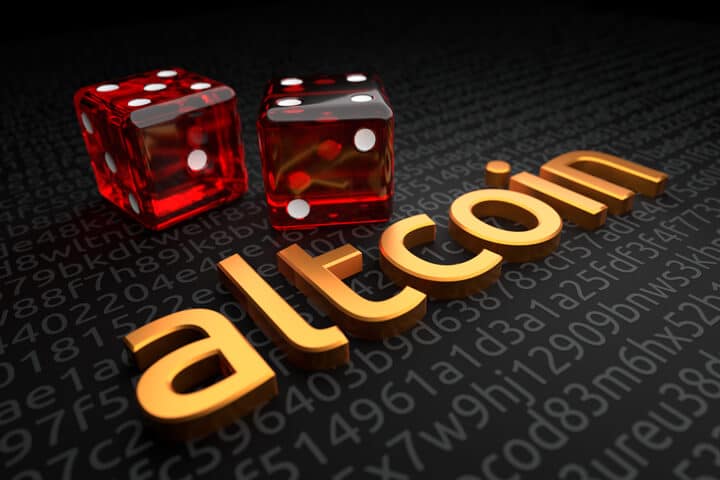









Got a Questions?
Find us on Socials or Contact us and we’ll get back to you as soon as possible.